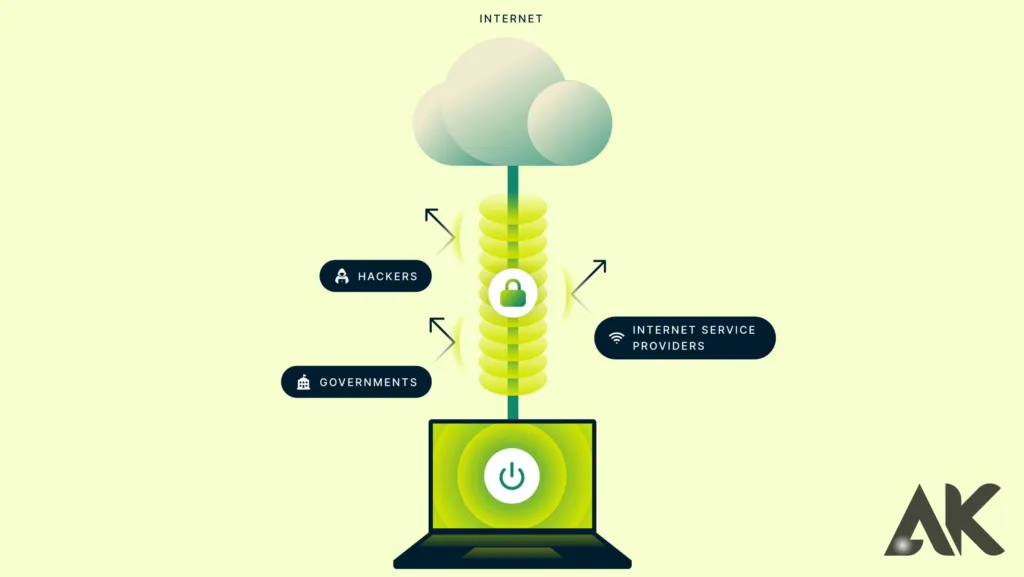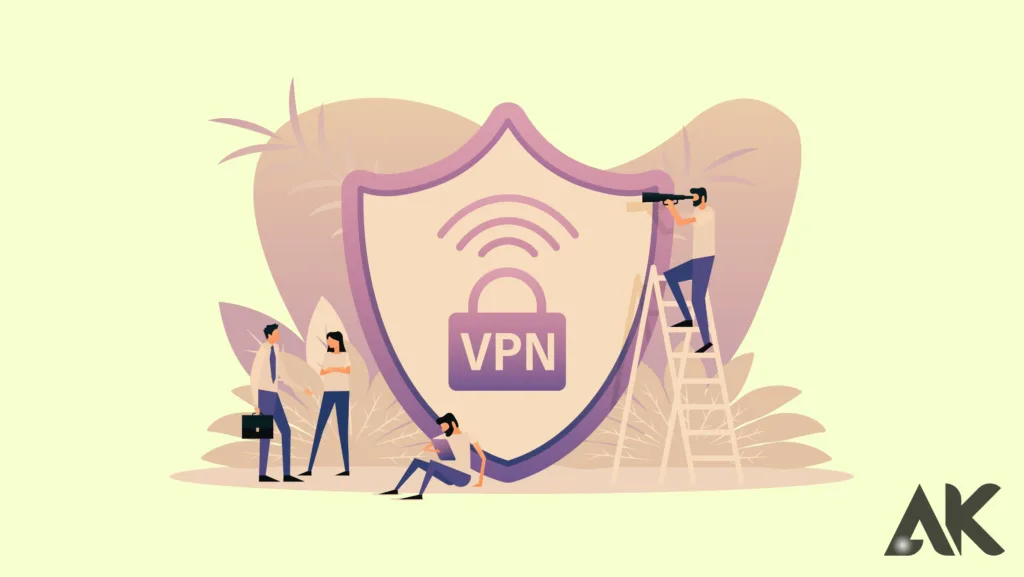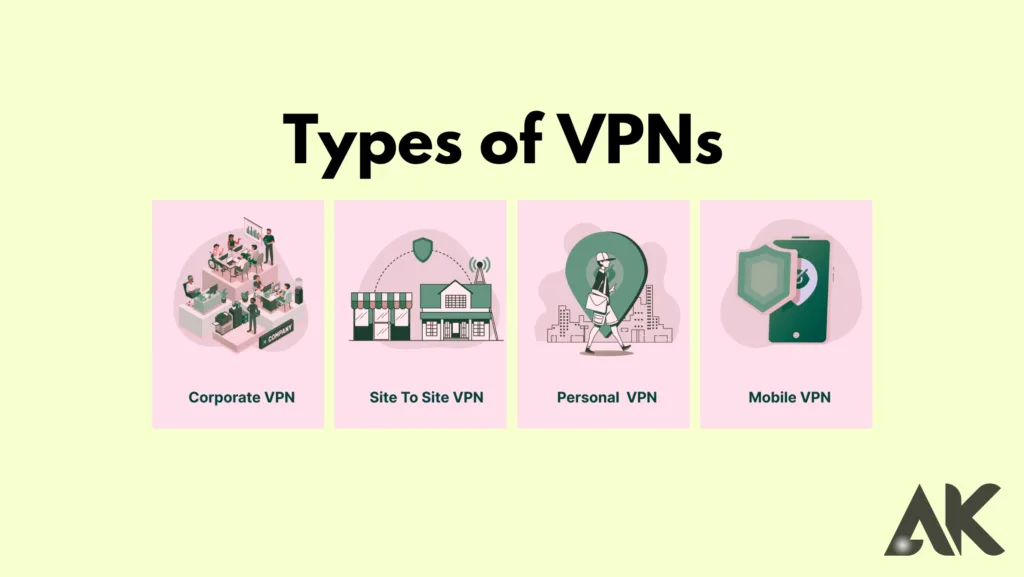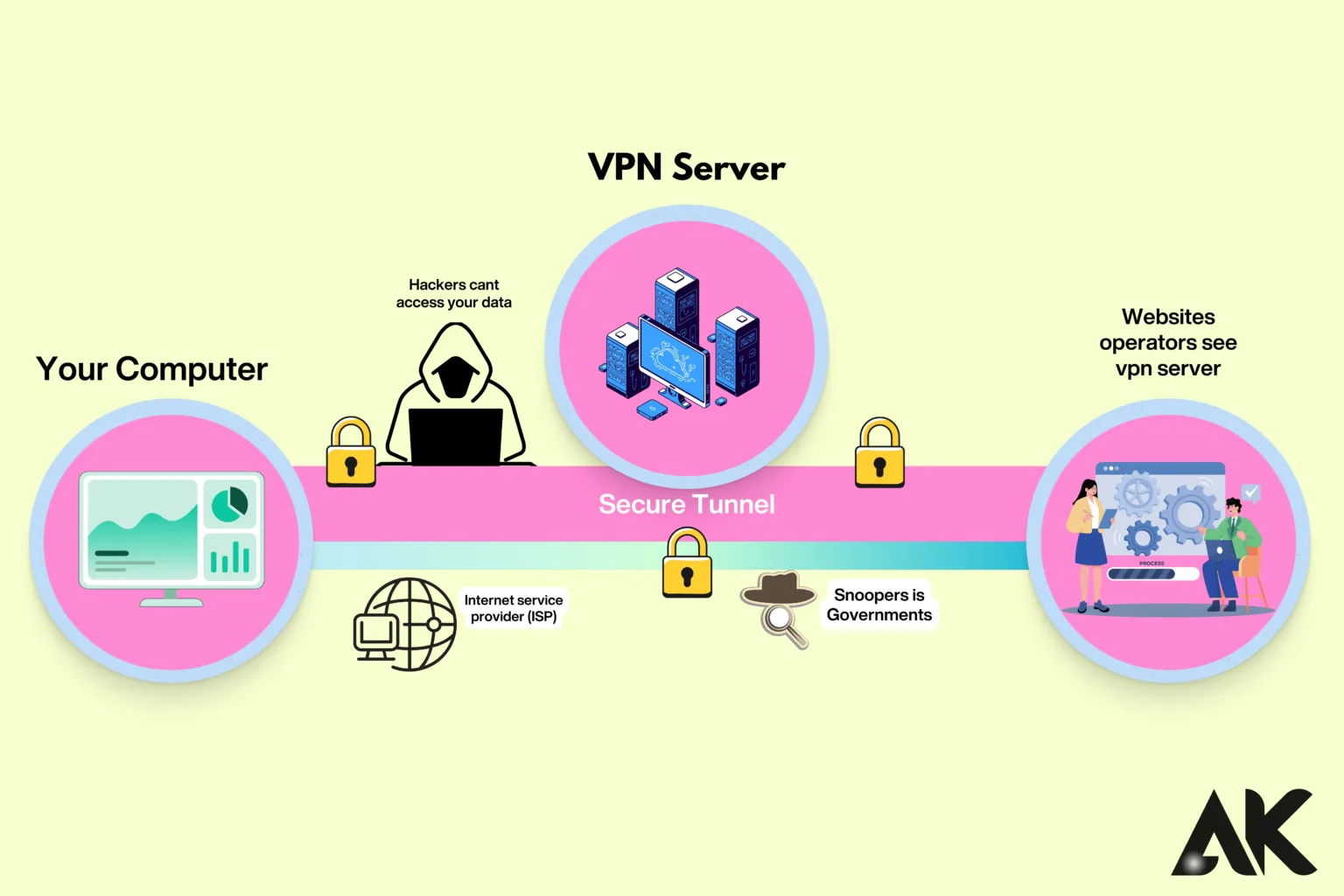VPN explained for beginners Internet security and privacy are more important than ever in the current digital era, which is where a virtual private network, or VPN, may help. A virtual private network, or VPN, is a service that creates a safe and secure connection between your device and the internet. It protects your data by acting as a tunnel, making it impossible for anyone to intercept or keep an eye on your online activity.
By hiding your true IP address and giving the impression that you are accessing the internet from a different location, a VPN adds an extra layer of security whether you are streaming, web browsing, or accessing sensitive data. By doing this, you may access content that might be blocked in your area, safeguard your privacy, and stop hackers from collecting your data.
Businesses and individuals alike frequently use VPNs to protect their internet activity. A VPN protects people’s privacy when they browse the internet, particularly on public Wi-Fi networks, which are frequently unprotected. VPNs are essential for businesses to secure remote access to company resources and safeguard critical data. Knowing how a VPN operates is crucial given the rise in online surveillance and cyber threats.
What is a VPN, and How Does It Work? VPN explained for beginners

VPN explained for beginners By protecting your internet connection, a virtual private network, or VPN, the service creates a safe “tunnel” for your online activities. Your internet traffic is routed via a private server rather than your internet service provider (ISP) when you use a VPN. No one, not even your ISP, hackers, or governmental organizations, can monitor your internet activity because of its encryption. In essence, a VPN conceals your actual IP address, giving the impression that you are connecting to the internet from a different place. Websites, advertisers, and other third parties are unable to follow you thanks to this extra security measure.
A safe, secure connection is set up between your device and the server when you connect to a virtual private network (VPN). This implies that every piece of information sent from your device—including emails, online transactions, and browsing activity—is jumbled and unintelligible to anyone attempting to intercept it. After decrypting the data, the VPN server forwards it to the internet on your behalf. Even while utilizing public Wi-Fi, this procedure helps conceal your identity and makes sure that no one can access your private data. To further protect your online identity, the server you connect to also gives you a new IP address.
Why Do You Need a VPN?

Improved privacy is the main reason why most individuals decide to use a VPN. Your ISP can see everything you do online, including the websites you visit, the files you download, and the services you use if you connect to the internet without a VPN. Even websites and online services can monitor your activity using your IP address, and they frequently provide marketers or other businesses access to this data. You may conceal your IP address with a VPN, which makes it much more difficult for websites and services to monitor your online activity. Because of this, VPNs are especially helpful for those who are worried about their online privacy.
Additionally, when using public Wi-Fi networks, VPNs are crucial for protecting your data. Hackers frequently target public Wi-Fi networks in locations like cafes, airports, and hotels due to their frequent unsecured nature. Hackers can obtain your data, including credit card numbers and passwords if you don’t use a VPN. A VPN secures your data from interception by encrypting your connection. VPNs are a crucial tool for individuals who frequently browse the internet while on the go due to their high level of protection, particularly when using public networks.
What Are the Different Types of VPNs?

VPNs come in a variety of forms, each meant to meet certain requirements. Site-to-site and remote access VPNs are the two most used varieties. People or workers who work remotely usually utilize a remote access virtual private network (VPN), which enables them to access a private network from any location. Because it enables users to browse the web safely, access content that is forbidden, and remain anonymous, this kind of VPN is frequently used for personal online security. The most popular VPNs for those looking for protection for their private information online are remote-access VPNs.
On the other hand, companies utilize site-to-site VPNs to safely connect several office locations online. Employees at various places can access the company’s internal network thanks to these VPNs, which are perfect for businesses with numerous branches or distant offices. Although site-to-site VPNs are more complicated than remote-access VPNs and usually need a more sophisticated setup, they are essential for companies that need to keep a private and secure network for data exchange and internal communication.
Benefits of Using a VPN
Using a VPN has several advantages beyond security and privacy. The ability to get around geo-restrictions and access content from various regions is one of the main benefits. For instance, the content libraries of numerous streaming services, including Netflix, Hulu, and BBC iPlayer, differ depending on the nation. By connecting to a server located in a foreign nation, a virtual private network (VPN) enables you to conceal your location and access content that might be blocked in your area. Because of this, VPNs are a useful tool for anyone who likes to stream TV series, movies, or content from websites that are restricted in their nation.
Avoiding censorship is a major advantage of utilizing a VPN, particularly in nations with stringent internet regulations. Governments in certain areas restrict access to information and ban websites or online services that are thought to be unsuitable or harmful. Users can get around these limitations and view uncensored content by using a VPN. With a VPN, you may access the free and open internet from anywhere in the globe by hiding your IP address and making it appear as though you are connecting from a different location.
How to Choose the Right VPN for You
Your unique needs, the degree of protection you demand, and the services you wish to access are some of the elements that will determine which VPN is best for you. The reputation of the VPN company, the encryption techniques they employ, and whether or not they have a no-logs policy should all be taken into account when choosing one. Maintaining your privacy requires that the VPN provider not trace your online activities, which is ensured by a no-logs policy. Additionally, search for VPNs that are compatible with all of your devices, have dependable servers, and offer rapid connections.
Make sure the VPN provider supports services like Netflix, Hulu, or Amazon Prime if you’re using it for streaming. Verify whether the VPN you’re thinking about is compatible with the content you wish to access, as some are more suited for getting over geo-restrictions than others. Finally, be mindful of the VPN’s price. Free VPNs may appear alluring, but they frequently have drawbacks like reduced security features and slower connections. Generally speaking, a paid VPN offers a better experience overall, particularly if you require greater security or access to premium content.
Common Misconceptions About VPNs
Despite being extremely useful tools for privacy and security, some consumers may not be able to use VPNs to their full potential due to certain misconceptions. One widespread misconception is that you become anonymous online when you use a VPN. By encrypting your connection and concealing your IP address, a VPN greatly improves your privacy, but it doesn’t completely hide you. Cookies and browser fingerprinting are two more ways that websites can still follow you. Use privacy-focused apps and browsers in conjunction with a VPN to increase your online anonymity.
The idea that all VPNs are the same is another common misunderstanding. In actuality, VPNs vary greatly in terms of features, speed, and security. While some VPNs concentrate on high-level security for enterprises, others are tailored for streaming. Furthermore, some free VPNs might compromise your privacy by gathering and selling your data, so it’s critical to do your homework and pick a trustworthy supplier. By being aware of these differences, you can choose a VPN that meets your unique requirements and keeps you safe.
Advanced Features to Look for in a VPN
Many modern VPNs offer advanced features beyond basic encryption and IP masking. For example, split tunnelling allows you to choose which apps or websites use the VPN and which ones connect directly to the internet. This feature is especially useful if you want to access local services without turning off the VPN entirely. Another advanced feature is a kill switch, which automatically disconnects your internet if the VPN connection drops, ensuring that your data is never exposed.
Additionally, some VPNs offer multi-hop connections, which route your traffic through multiple servers for added security. This is particularly beneficial for users who require the highest levels of anonymity, such as journalists or activists operating in restrictive regions. Features like ad-blocking, malware protection, and dedicated IP addresses are also increasingly common, making VPNs versatile tools for both privacy and productivity.
Conclusion
VPN explained for beginners Anyone who wants to protect their internet security and privacy must have a VPN. A VPN can help protect your online activity from prying eyes, whether you’re streaming entertainment, accessing sensitive data, or browsing the web. A VPN guarantees that you have greater control over your online presence by hiding your IP address, encrypting your connection, and granting you access to content that is blocked.
Selecting the best VPN for your purposes may first seem intimidating to novices, but you can choose the finest VPN for your needs by taking compatibility, speed, and security into account. Using a VPN is one of the easiest and most efficient ways to protect your digital life in a world where online threats are getting more complex.
FAQ
Q1: Why do I need a VPN and what is it?
To improve security and privacy, a virtual private network, or VPN, encrypts your internet connection. By hiding your IP address, it helps keep your data safe from hackers and lets you access information from other countries.
Q2: Can my smartphone be used with a VPN?
Yes, the majority of VPNs offer apps for both iOS and Android and are compatible with cell phones. Especially when utilizing public Wi-Fi, installing a VPN on your phone helps safeguard your internet connection.
Q3: Is it legal to use a VPN?
Using a VPN is entirely legal in the majority of nations. Nonetheless, several nations prohibit or limit the use of VPNs, especially for purposes like getting around restrictions by the government. Make sure you review the local legislation in your community.
Q4: Can my internet speed be slowed down with a VPN?
Because of the encryption procedure, a VPN may cause a tiny decrease in your internet speed. High-speed servers provided by trustworthy VPNs, however, lessen this effect and guarantee a seamless internet experience.

